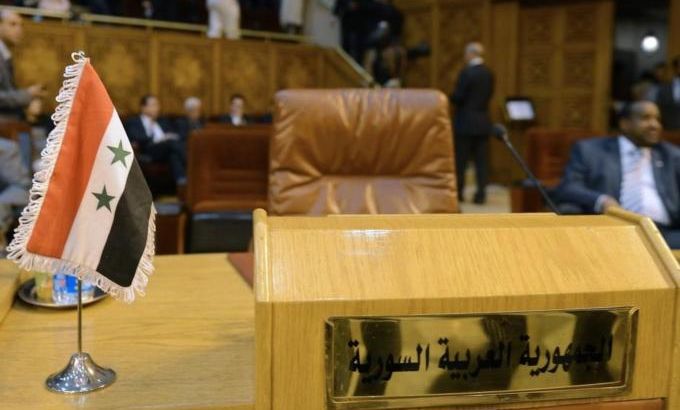Arab League backs Syrian opposition bloc
New coalition gains recognition as air raids batter border towns and Israeli tanks fire into Syria for a second day.

The Arab League has recognised the newly formed Syrian opposition bloc as the legitimate representative of the Syrian people.
Arab foreign ministers meeting in Cairo, Egypt, issued a statement late on Monday describing the new National Coalition of the Syrian Powers of Revolution and Opposition as “the legitimate representative and main interlocutor with the Arab League”.
They called on “the rest of the opposition to join this national coalition so that it brings together all segments of the Syrian people”.
The Cairo talks came a day after opposition groups announced in Qatar the formation of a broad-based coalition against the government of Bashar al-Assad, Syria’s president.
They pledged to set up a transitional government after the new bloc gained international recognition.
The coalition has already drawn backing from Gulf Arab states and other regional and international powers.
GCC recognition
Reading out the meeting’s final resolution late on Monday, Hamad bin Jassim Al Thani, Qatari prime minister and foreign minister, said: “The Arab League ministerial council welcomes the agreement that the Syrian opposition parties reached … and calls on the other opposition parties to join this coalition.”
The ministers “urged regional and international organisations to recognise it as a legitimate representative for the aspirations of the Syrian people”, and called it “a legitimate representative and a primary negotiator with the Arab League”.
The Gulf Co-operation Council (GCC) said earlier on Monday that its six member states – Saudi Arabia, Bahrain, the United Arab Emirates, Oman, Qatar and Kuwait – had decided to recognise the new Syrian opposition bloc.
“The states of the council announce recognising the National Coalition for the Forces of the Syrian Revolution and Opposition … as the legitimate representative of the brotherly Syrian people,” Abdullatif al-Zayani, the GCC chief, said.
The statement said the GCC was “looking forward to Arab states and the international community recognising the coalition”.
Zayani said he hoped that the formation of the new coalition “would lead to ending the bloodshed, protect the territorial unity of Syria, and to hold a general national congress to pave the way to build a state ruled by law and open to all its citizens without exceptions or discrimination”.
The Arab League meeting’s final resolution was less clear than the GCC’s recognition of the opposition coalition as “the legitimate representative of the Syrian people”.
One Arab League official, talking on condition of anonymity, said: “Reservations on the document came from Iraq and Algeria
“Iraq’s reservation was not clear but Algeria … asked for more time before the Arab League can start dialogue with the opposition coalition. Algeria also had a reservation on the fact that this coalition did not represent all the opposition factions.”
Al Jazeera’s Jacky Rowland, reporting from Cairo, said: “The newly established coalition is now starting to get the recognition it needs from other bodies.
“But the Arab League stopped short of recognising it as the sole representative of the Syrian people. Rather it recognised the coalition [as representing] the ‘aspirations’ of the Syrian people.
“The coalition was given observer status [at the Arab League]. They haven’t yet been offered the chair left empty since Assad was no longer welcome. So observer status is a good first step.”
International reactions
The US, which put pressure on splintered opposition groups to unify, has called the coalition a “vitally important step”.
Laurent Fabius, French foreign minister, called it a “major step in the essential process of unifying the Syrian opposition”.
Germany hoped the coalition will provide a “credible” alternative to Assad’s regime.
In Berlin, Guido Westerwelle, German foreign minister, said he hoped that the coalition would be “a credible political alternative to the regime” of Assad.
By contrast, Hassan Nasrallah, head of Lebanon’s pro-Syrian Shia Muslim group, denounced the opposition coalition as “a new US invention,” which would lead to more bloodshed in Syria.
The Syrian opposition “met in Doha, confined themselves for one week in a hotel to form a new group and did what [US Secretary of State Hillary] Clinton and America wanted”, he told a rally in Beirut’s southern suburbs.
Border shooting
Inside Syria, fighting flared on Monday on the border with Turkey, while Israeli tanks destroyed a Syrian artillery battery after a Syrian shell landed near a military post on the occupied Golan Heights.
It was the second time in two days that a Syrian shell landed on the strategic territory, which Israel captured from Syria in the 1967 Middle East war and later annexed.
The Syrian shell appeared to have strayed into Israel during fighting between Syrian government forces and rebels near the border.
The Israeli army said it had filed a complaint with UN peace observers positioned in the buffer zone.
Elsewhere, Syrian government aircraft carried out air raids in the rebel-held northeastern town of Ras al-Ain near the Turkish border, killing at least 21 people and wounding 70, anti-government activists said.
The air raids shattered windows in the Turkish village of Ceylanpinar.
Inside Turkey, a soldier and two civilians were wounded during clashes between the Syrian army and rebels near the border.
Activists said Monday’s death toll across Syria reached 109.